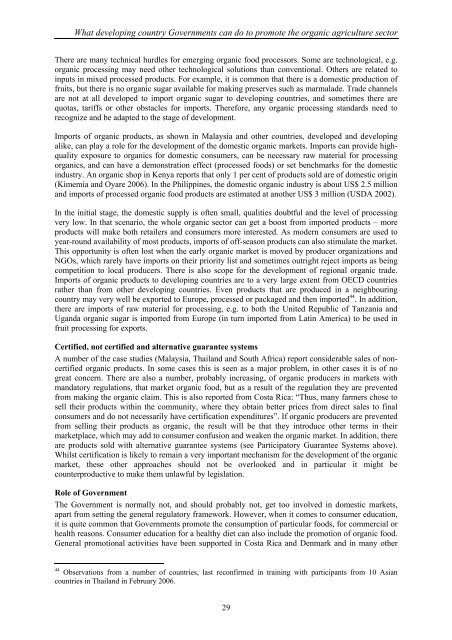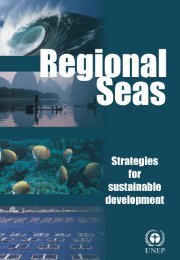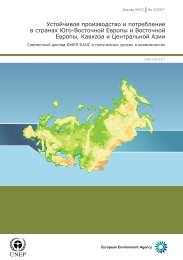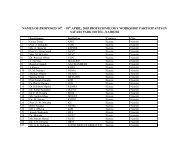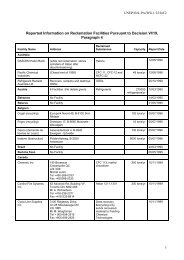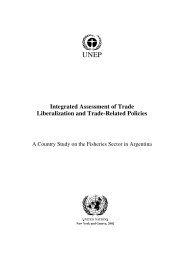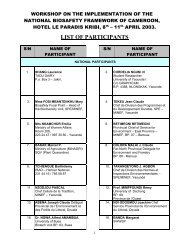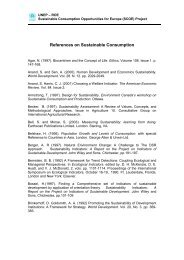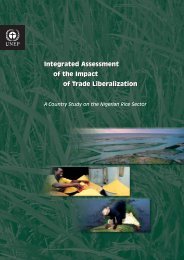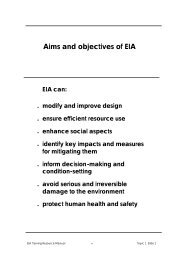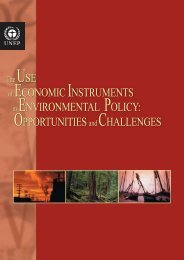Best Practices for Organic Policy - What developing country - UNEP
Best Practices for Organic Policy - What developing country - UNEP
Best Practices for Organic Policy - What developing country - UNEP
You also want an ePaper? Increase the reach of your titles
YUMPU automatically turns print PDFs into web optimized ePapers that Google loves.
<strong>What</strong> <strong>developing</strong> <strong>country</strong> Governments can do to promote the organic agriculture sector<br />
There are many technical hurdles <strong>for</strong> emerging organic food processors. Some are technological, e.g.<br />
organic processing may need other technological solutions than conventional. Others are related to<br />
inputs in mixed processed products. For example, it is common that there is a domestic production of<br />
fruits, but there is no organic sugar available <strong>for</strong> making preserves such as marmalade. Trade channels<br />
are not at all developed to import organic sugar to <strong>developing</strong> countries, and sometimes there are<br />
quotas, tariffs or other obstacles <strong>for</strong> imports. There<strong>for</strong>e, any organic processing standards need to<br />
recognize and be adapted to the stage of development.<br />
Imports of organic products, as shown in Malaysia and other countries, developed and <strong>developing</strong><br />
alike, can play a role <strong>for</strong> the development of the domestic organic markets. Imports can provide highquality<br />
exposure to organics <strong>for</strong> domestic consumers, can be necessary raw material <strong>for</strong> processing<br />
organics, and can have a demonstration effect (processed foods) or set benchmarks <strong>for</strong> the domestic<br />
industry. An organic shop in Kenya reports that only 1 per cent of products sold are of domestic origin<br />
(Kimemia and Oyare 2006). In the Philippines, the domestic organic industry is about US$ 2.5 million<br />
and imports of processed organic food products are estimated at another US$ 3 million (USDA 2002).<br />
In the initial stage, the domestic supply is often small, qualities doubtful and the level of processing<br />
very low. In that scenario, the whole organic sector can get a boost from imported products – more<br />
products will make both retailers and consumers more interested. As modern consumers are used to<br />
year-round availability of most products, imports of off-season products can also stimulate the market.<br />
This opportunity is often lost when the early organic market is moved by producer organizations and<br />
NGOs, which rarely have imports on their priority list and sometimes outright reject imports as being<br />
competition to local producers. There is also scope <strong>for</strong> the development of regional organic trade.<br />
Imports of organic products to <strong>developing</strong> countries are to a very large extent from OECD countries<br />
rather than from other <strong>developing</strong> countries. Even products that are produced in a neighbouring<br />
<strong>country</strong> may very well be exported to Europe, processed or packaged and then imported 44 . In addition,<br />
there are imports of raw material <strong>for</strong> processing, e.g. to both the United Republic of Tanzania and<br />
Uganda organic sugar is imported from Europe (in turn imported from Latin America) to be used in<br />
fruit processing <strong>for</strong> exports.<br />
Certified, not certified and alternative guarantee systems<br />
A number of the case studies (Malaysia, Thailand and South Africa) report considerable sales of noncertified<br />
organic products. In some cases this is seen as a major problem, in other cases it is of no<br />
great concern. There are also a number, probably increasing, of organic producers in markets with<br />
mandatory regulations, that market organic food, but as a result of the regulation they are prevented<br />
from making the organic claim. This is also reported from Costa Rica: “Thus, many farmers chose to<br />
sell their products within the community, where they obtain better prices from direct sales to final<br />
consumers and do not necessarily have certification expenditures”. If organic producers are prevented<br />
from selling their products as organic, the result will be that they introduce other terms in their<br />
marketplace, which may add to consumer confusion and weaken the organic market. In addition, there<br />
are products sold with alternative guarantee systems (see Participatory Guarantee Systems above).<br />
Whilst certification is likely to remain a very important mechanism <strong>for</strong> the development of the organic<br />
market, these other approaches should not be overlooked and in particular it might be<br />
counterproductive to make them unlawful by legislation.<br />
Role of Government<br />
The Government is normally not, and should probably not, get too involved in domestic markets,<br />
apart from setting the general regulatory framework. However, when it comes to consumer education,<br />
it is quite common that Governments promote the consumption of particular foods, <strong>for</strong> commercial or<br />
health reasons. Consumer education <strong>for</strong> a healthy diet can also include the promotion of organic food.<br />
General promotional activities have been supported in Costa Rica and Denmark and in many other<br />
44 Observations from a number of countries, last reconfirmed in training with participants from 10 Asian<br />
countries in Thailand in February 2006.<br />
29


